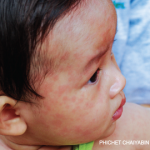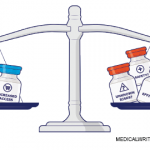
Father and daughter, Len Calabrese, DO, FACR, and Cassie Calabrese, DO
Rheumatologists spend so many years treating the same patients, sometimes they start to feel like family. But for some doctors, it’s more than a feeling. The specialty attracts its fair share of relatives who can compare rheumatic notes, discuss complex cases and provide a built-in resource for advice. Brothers. Cousins. Fathers and daughters. In-laws. Husband and wife. Call it family practice, rheumatology style. Here are their stories.
A Novel Relationship
Leonard “Len” Calabrese, DO, FACR, has been a rheumatologist for 37 years. His Cleveland Clinic business card is overflowing with titles, including vice chair of the Department of Rheumatic and Immunologic Diseases, co-director of the Center for Vasculitis Care and Research and director of RJ Fasenmyer Center for Clinical Immunology. To Cassandra “Cassie” Calabrese, DO, he’s just dad.
‘[Dr. Len Calabrese] likes to say, at Cleveland Clinic, it’s ‘Take Your Daughter to Work Day,’ every day.’
Cassie followed her father’s path into rheumatology, but not because he pushed. She had a natural affinity for microbiology in high school, one pushed further by a stint in a Cleveland Clinic laboratory that most high schoolers never see. Also, her mom is a recently retired mental health worker there, and her sister is an administrator who runs the immunology center where the Drs. Calabrese both work.
Given the family affair, when Cassie decided she wanted a dual focus on rheumatology and infectious diseases, it wasn’t hard to pick where. Cleveland Clinic got approval from the Accreditation Council on Graduate Medical Education to create a one-of-kind fellowship for board certification in both specialties. And now she works with about as good a sounding board as possible: Her dad.
“It’s been wonderful,” says Cassie, now in the final year of her novel three-year fellowship. “He has been the best resource through my whole life, and since I’ve been in medicine—for obvious reasons. He’s such a great resource. We see a lot of complex cases, for example, patients with rheumatologic diseases on immunosuppression that get some weird infection that you don’t see everywhere.
“We get a lot at the Cleveland Clinic. A lot of people ask me if I don’t like working with my dad, if I do like working with my dad, what it’s like. I love it. His office is right down the hall from mine. I staff patients with him. We do research together. As my dad likes to say, at Cleveland Clinic, it’s ‘Take Your Daughter to Work Day,’ every day.”
The Calabreses have already published together, and Len uses Cassie as a resource for how to become more involved in social media. Len even has a Wikipedia page.
The elder Calabrese says his daughter’s inquisitive presence in the hospital is just as valuable for him as his expertise and experience are for her. Maybe more so.
“I’m much younger today than I used to be,” he says. “You have that constant buzz, and you’re generating the questions rather than the answers. As long as you keep doing that, I think you keep getting younger. Once you think you start the knowing the answers, it’s all downhill from there.”
Brotherly Bond
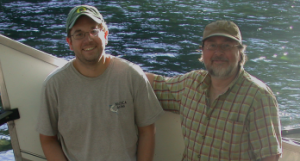
Brothers Brian Daikh, MD, and David Daikh, MD, PhD
New ACR President David Daikh, MD, PhD, didn’t necessarily see himself as a father figure to his brother Brian, but given an age difference of eight years, he always knew he’d be a role model.
Little did he know that Brian Daikh, MD, would end up in his literal footsteps, including medical degrees from Oregon Health & Science University School of Medicine, fellowships in rheumatology and then decades of clinical practice.
“We’ve ended up doing a lot of similar things,” Brian says in an understatement.
“I always say that he’s younger, smarter and better looking than I am,” David says of Brian.
For David, ACR president, fellowship program director University of California San Francisco, and an academic rheumatologist who does research, teaching and sees patients, there is tremendous value in talking to Brian, who is primarily a clinician, as well as a clinical assistant professor at Tufts University School of Medicine in Boston.
“There’s a kind of shared experience. … You don’t have to go through a lot of explanation to understand where the other person is coming from or where your question came from,” David says. “It’s great to be able to pick up the phone and ask my brother what he thinks about a case.”
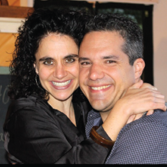
Tina Elias-Todd, MD, and
Derrick Todd, MD
Of course, you don’t need to be related to the ACR president for your voice to be heard, but Brian adds that it’s nice to know that as a clinician, his viewpoints have a direct path to the specialty’s highest level. “In rheumatology, people who are in private practice rheumatology have a much different perspective on issues than someone who is a scientist or someone in an academic center, and it’s nice to be able to make our voices heard,” he says.
David, “on a number of occasions, has asked me my thoughts on specific issues. It’s nice to have that one-on-one situation where I can voice my thoughts and concerns and know someone is going to listen.”
2 for 1 in Boston
Three days before starting at University of Massachusetts Medical School in Worcester, Mass., in August 1995, Tina Elias-Todd, MD, met Derrick Todd, MD. A few years later, Tina was a first-year fellow at Boston Medical Center—after having been drawn to the field through its underlying immunology—when Derrick was a fourth-year student, debating between rheumatology and endocrinology.
One morning, at roughly 1 a.m., a patient came to Derrick with a hot, swollen knee. “I needed somebody to help me tap the knee,” he says. “But there was no one in the hospital who could help me do that, at least not immediately. So I actually called my wife in the middle of the night and said, ‘Tina, how do you tap a knee?’ And her sleepy words were something like, ‘Are you kidding me? Are you calling me in the middle of the night about this? You just feel for the fluid and jam the needle in there!” That’s how I learned how to do one of the basic procedures of rheumatology.”
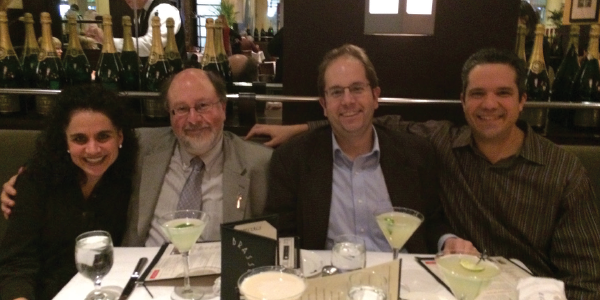
Tina Elias-Todd, MD, David Daikh, MD, PhD, Brian Daikh, MD, and Derrick Todd, MD
After three decades of marriage and two kids, the husband-and-wife doctor duo still work to be a rheumatic resource for each other.
“It’s something that we do at home on a fairly routine basis, because we are always trying to sort out these different clinical conundrums and challenges,” says Tina, who happens to also be a cousin of the the Daikh brothers. “I will frequently tell my patients as I’m working them up, ‘Yeah, I discussed my case with my colleagues at work, and oh, by the way, my husband is also a rheumatologist. You benefit from two for one.”
In a field like rheumatology, in which detective work is half the job, the couple says having another beat cop in the house is a boon to them and their patients. Derrick practices at Brigham and Women’s Hospital in Boston, while his wife is a senior staff physician at Lahey Clinic Medical Center in the Boston suburb of Burlington.
“You know the story, if you put 10 rheumatologists in a room and ask them about a case, you’ll get 20 opinions,” Derrick says. “In order to treat a patient with confidence, you have to be confident in the diagnosis yourself. And if you can’t convince a colleague that your position is correct, then you have to admit it’s in the gray zone. I’ve used Tina as a sounding board quite frequently, and vice versa.”
‘It’s Just the Best’
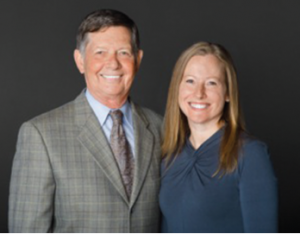
Father and daughter, William Arnold, MD, FACP, MACR, and Erin Arnold, MD, FACR
Maybe the person most surprised that Erin Arnold, MD, FACR, became a rheumatologist was her father, recently retired rheumatologist William Arnold, MD, FACP, MACR. No doubt, though, that the person most supportive was the same guy.
“As a new doctor, to have somebody there that is by your side that you know is going to support you, beyond because of what they think of as your capabilities as a physician, but because they are so entrenched in who you are as a person, is really a wonderful confidence booster and an incredible foundation to start a new career,” Erin says. “to have somebody you can walk up to and say, ‘Here’s an X-ray. Which hand is the left hand, and which hand is the right hand?’—simple stuff like that when you are a brand new attending—is really important.”
The pair worked so well together for years at a large practice that three years ago, they joined a father-and-son team to open Orthopaedics and Rheumatology of the North Shore, in Skokie, Ill.
The Drs. Arnold share similar diagnostic styles, a common appreciation for cutting-edge treatments and a desire to use the best information at hand to solve the mysteries so often presented by patients.
“Over the last three years, we adopted the same style of practice,” says the elder Arnold, who retired last year. “And that’s really important. We use the same measurement techniques. We use the same laboratory information. Our decision making was in many ways so parallel that our patients, once they would switch to Erin, would see she used the same parameters as I did to make decisions. Not arbitrary, but objective findings.”
A fun quirk of the new practice the Arnolds started a few years ago was that Erin and the son of the other practitioner were technically the bosses. But she was raised better than to make that an issue, and William freely admits that spending the last few years of his career working hand in hand with his daughter was amazing.
“It is really difficult for fathers and daughters to have a long-term relationship that is interactive,” he says. “The usual interaction on a significant level is between the mother and the daughter. They have a bond that is indescribable. It is just so satisfying to be able to talk to my daughter on that level. It’s beyond belief.”
Dr. Zamore says. ‘It’s one of the reasons you go into rheumatology—because you like the people.’
‘Sharing … Things That Our Family Does’
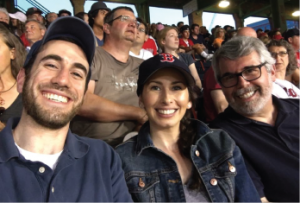
Rich Zamore, MD, his wife, Alex, and Jonathan Kay, MD
Massachusetts rheumatologist Jonathan Kay, MD, is a mentor to dozens of rheumatologists across the country. He’s also father-in-law to Rich Zamore, MD, a first-year fellow at the Hospital of the University of Pennsylvania in Philadelphia.
“For the practical aspects of being a fellow, Jon is an amazing resource,” Dr. Zamore says, “whether it be for career development questions or how to find a mentor. We tend not to talk about clinical stuff too much—to spare [my mother-in-law] Debbie and [my wife] Alex, but it’s fun to run a case by him every now and then.”
After three decades of working with fellows, Dr. Kay, a professor of medicine at the University of Massachusetts Medical School, where he holds the Timothy S. and Elaine L. Peterson Chair in Rheumatology, says there’s just something different about talking to the young rheumatologist who married his daughter.
“I’ve worked with fellows in training for three decades,” Dr. Kay adds. “But it’s really nice to see someone whom I love developing his career. As much as I care about each of the fellows that I’ve trained, there’s a special connection with Rich because he’s my daughter’s husband and, I hope, will be the father of my grandchildren. I’m proud to see him doing so well, and it gives me special joy when I hear faculty members in his program praise him.”
As a first-year fellow, Dr. Zamore knows he’s a novice in the field. Yet he has direct access to Dr. Kay’s breadth of knowledge. It’s something the budding rheumatologist understands—and appreciates. “It’s absolutely an amazing resource, and really nice to have,” Dr. Zamore says.
Dr. Zamore also looks forward to getting to know Dr. Kay’s colleagues. “I really look forward to that opportunity because they seem like such a great group of people,” Dr. Zamore says. “It’s one of the reasons you go into rheumatology—because you like the people.”
Dr. Zamore will soon get his chance, as Dr. Kay plans to introduce him to friends and colleagues at the 2018 ACR/ARHP Annual Meeting in Chicago.
“I see my involvement as an addition to the excellent training in rheumatology that Rich is getting at Penn,” Dr. Kay adds. “In addition to having him as my son-in-law, I look forward to going to meetings together and bringing him into my group of rheumatology colleagues. I won’t be giving Rich something that he wouldn’t be able achieve on the basis of his own accomplishments, but I’ll be sharing with him things that our family does.”
Just Getting Started
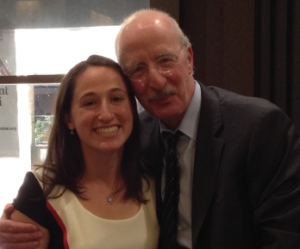
Monica “Nikki” Schwartzman, MD, with her father, Sergio Schwartzman, MD
Monica “Nikki” Schwartzman, MD, actually grew up thinking that as a physician she would do anything but rheumatology, what her father, Sergio Schwartzman, MD, had done his entire professional life. She was interested in renal disease while in medical school, but quickly learned the importance of the immune system in many diseases that affect the kidney. Once she made that connection and recognized that the driving force of rheumatology is autoimmunity, rheumatology was her new aspiration.
Nikki, who will begin her rheumatology fellowship this coming July, can already picture working with her father, who is an associate attending physician at the Hospital for Special Surgery in New York.
“My dad and I have a very good relationship,” Nikki says. “I think we’d actually work really well together. That pulls from our obviously very long relationship, also from a professional perspective. We’ve done a number of research projects together in the past, and I have spent some days with him in his office. It’s something we’ve done before, and it’s worked really well.”
Sergio isn’t predicting an uptick in phone calls to talk about questions his daughter can’t answer. “I expected in medical school and residency that I would get those phone calls,” he says. “Do you know how many times I got those phone calls? Not once. Literally, not once she did call me about a patient or an exam question.”
Nikki says the way residency at New York’s Mount Sinai Hospital was structured, she sought answers from attendings first. But when a novel patient cropped up, one that she thought was interesting, she’d call dad just to talk about that patient.
“There’s a really interesting case that you want to share with someone and you want to talk about, and that’s something that we have done,” she says, “Just the things we see in the hospital and the things we see on the floor. They’re really incredible and really exciting, and it’s fun to be able to talk to someone who is in medicine and understands that.
Given her research during medical school and residency, Nikki has already developed a focused interest in glomerulonephritis, something her father has never worked on.
He is already looking forward to using her as a resource in that realm. “I see this as a two-way street, not a one-way street,” he says.
Richard Quinn is a freelance writer in New Jersey.
